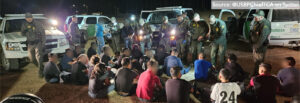For more information, please contact:
Maureen Meyer, Mexico and Central America Associate, WOLA
(202)-797-2171, mmeyer@wola.org
To access more resources on the case, click here.
The Mexican government will be taken before the Inter-American Court on Human Rights on April 28th for its failure to resolve the 2001 murders of three women in Ciudad Juarez, Chihuahua. After years of struggle, the victims’ families will finally have an opportunity to achieve justice for their murders. This is the first case being heard before the Inter-American Court whose central issue is gender violence and it is only the third case to be brought against the Mexican government. The Court’s resolutions are legally binding.
Over 400 women have been killed in Ciudad Juarez and Chihuahua since 1993. In spite of national and international efforts, impunity prevails in over half of the cases. The Washington Office on Latin America (WOLA) has worked with partner organizations to prevent violence against women in Mexico and to attain justice for the families of women and girls who have been murdered in Ciudad Juarez and Chihuahua. WOLA is in contact with the lawyers of the victims’ families and experts involved in the case and we will be providing analysis and public access to the testimonies following the hearing.
The case before the Court involves the deaths of Esmeralda Herrera Monrreal, Claudia Ivette González Banda and Laura Berenice Ramos whose bodies, along with those of five other women, were found on November 6 and 7, 2001 in a lot in Ciudad Juarez known as the “Cotton Field.” The investigations into these murders have been wrought with irregularities, beginning with the fact that the authorities refused to look into the whereabouts of these women until 72 hours after their disappearances had been reported. Three months after the bodies were found, volunteers searching the site discovered clothing that was recognized by the mother of one of the victims who had participated in the search, as well as hair, shoes, and clothing remnants, none of which had been gathered by police investigators during their search.
Days after the bodies were found Mexican authorities arrested Victor Garcia Uribe who was tortured into confessing his responsibility for the murders and who named Gustavo Gonzalez Meza as his accomplice. Gonzalez Meza was also tortured into confessing. On February 8, 2003, Gustavo Gonazlez Meza was found dead in prison after surgery under what various human rights organizations called “highly suspicious” circumstances (1). A year earlier, Gonzales Meza’s lawyer had been shot dead by judicial police. Victor Javier Garcia was absolved of the crime in July 2005 due to a lack of evidence against him.
Throughout the investigations, the victims’ family members were never taken into account. It was due to this denial of justice that the case was brought before the Inter-American Commission on Human Rights (IACHR) in 2002. After holding hearings and several deliberations, in 2007 the Commission petitioned the Inter-American Court to assume the case against the Mexican State “regarding the responsibility it has incurred in failing to provide measures of protection to [the victims]; the lack of prevention of gender crimes, despite full knowledge of the existence of a pattern of violence that had left hundreds of women and girls murdered by the time of the facts; the lack of response on the part of the authorities to the disappearance of the victims; the lack of due diligence in the investigation of the victims’ murders, as well as the denial of justice and the failure to provide adequate compensation to their next of kin.” (2)
The public hearing on the “Cotton Field” murders will be held on April 28 and 29th in an extraordinary session of the Court in Santiago, Chile. Lawyers for the victims’ families’ and the families’ representatives will be at the hearing and will be available for comment. Experts from the Argentine Forensic Anthropology Team (Equipo Argentino de Antropologos Forenses, EAAF), who since 2005 have been working to identify remains of women in Ciudad Juarez, will also be submitting written statements for the case. Subsequent to the hearing, WOLA will provide information on the testimonies and written statements on our webpage.
The case before the Inter-American Court on Human Rights is an important opportunity to bring justice to the women who have been murdered in Ciudad Juarez and to highlight the Mexican government’s failure to investigate and prosecute those responsible for gender violence and the countless disappearances and murders of girls and women in the state of Chihuahua since 1993. Effective remedies to address impunity for these murders will also combat the impunity that prevails for most crimes in Mexico, including the drug-related murders that have plagued Ciudad Juarez in recent months.
(1) LAWG, Scapegoats of Juarez: The Misuse of Justice in Prosecuting Women’s Murders in Chihuahua, Mexico.
(2) http://www.cidh.oas.org/demandas12.496-7-8%20Campo%20Algodonero%20Mexico%204%20noviembre%202007%20ENG.pdf
*******************
If you wish to speak to the lawyers for the case, please contact:
Karla Micheel Salas
Asociación Nacional de Abogados Democráticos
México
Cell phone: (044) 55- 3455- 1117
If calling from outside of Mexico, please dial (52-1) 55-3455-1117

